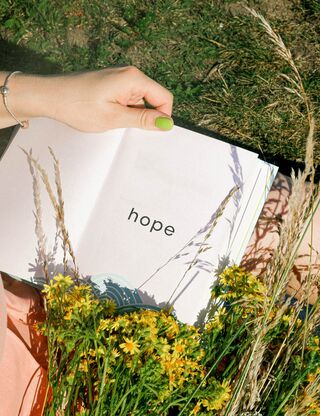Grief
How Will You Write Your Own Pandemic Story?
Our COVID year shaped our identities. Is yours a story of hope or hopelessness?
Posted March 29, 2021 Reviewed by Chloe Williams
Key points
- The way we tell our life story helps to shape our identities and predicts how we will proceed.
- When we think about our pandemic year, we can construe it as a story of growth or as a story of loss.
- Contamination stories emphasize a downturn while redemptive stories emphasize hope and are linked to long-term mental health and life satisfaction.
- It's possible to turn a contaminated story into a redemptive story by thinking about the story's detail, their significance and how they have positioned you for growth.
Without a doubt, the last year and associated changes have been extraordinarily difficult for everyone, even if we weren’t afflicted with anything beyond the pandemic. With the anniversary of COVID-19’s arrival in the United States, it’s natural that we are all replaying the last year and trying to make sense of our lives. Why did this happen? What does this mean for me? Am I a different person than I was this time a little over a year ago? Will it ever get better? Will I ever be the same?
Narrative personality psychologists study life stories: how we process the events of our lives in an attempt to find meaning, purpose, identity, and resolution. How we construct and tell ourselves these stories reveals who we are and predicts how we will proceed from here.
Our life story is more than just a collection of objective events that have happened to us—like all authors of great fiction, we interpret them and use them as an impetus for growth rather than merely record them. Everything that happens to us tells us something about who we are at our core and why we are here. Over our lives, we write and constantly rewrite our stories as we experience more of life and gain more perspective on our past and present. As we tell ourselves our story, it allows us to understand our goodness and badness, our goals and motivations, and whether the world is beautiful and meaningful or ugly and meaningless.
Regardless of the characters, settings, events, and resolutions, life narratives can be thought of as redemptive or contaminated. When you construct a story of redemption, you have a sense that all you’ve been through has brought you to a better place. Even if you experienced pain, you are better for it, and there will be sunshine tomorrow. When you write a life story tinged with contamination, you perceive that something that could’ve been good turned sour. The pain and hardship were for naught—you are not better for it, and the future looks just as bleak. Interestingly, whether we view our stories as redemptive or contaminated is not dependent on what happens to us, but rather, how we construe it.
Contamination: When Darkness Consumes the Light
It is easy for the last year to feel contaminated when one thinks about the series of unfortunate events that comprised 2020-2021. For my own part, in January 2020, the start of a brand new year, my beloved grandmother, my heart, the other pea in my pod, passed from this earth. Two weeks later, my best feline friend got a severe kidney infection and almost died, and only made it through because I gave him nearly 24/7 nursing, sub-q fluids, and medications injected at home, all while I was experiencing debilitating grief.

The next month, the F-5 tornado that is COVID swept through the country, and my university went online. My job became exponentially more difficult, and I lost the last precious few months with the seniors with whom I had cultivated relationships over four years. A few months after that, an interpersonal bomb went off when I learned one of my close friends was having an affair with her best friend’s (and one of my other close friend’s) husband, a situation which, due to the smallness of my community, sent and continues to send shock waves through my social, work, and church lives. Peppered throughout were national crisis after national crisis and a catastrophic computer crash that lost me years of work.
My once-promising year is now colored by grief. Grief for my grandmother. Grief over friendships I once cherished, now irreparably broken. Vicarious grief for my innocent friend and her children who experienced loss in every facet of their lives. Hard things followed hard things. Fatigue never lessened.
Objectively, the pandemic year was good for me in many ways. It caused me to slow down, start a fitness regimen, and restart my vegetable garden in memory of my grandmother. Even my grief transformed into gobs and gobs of art that I’m proud of. But despite those things, and despite seeing some redemption, my pandemic story leans more heavily toward contamination. Bad things keep happening, and I feel I’ve become more subdued and withdrawn. I’ll never get my grandmother back. My elderly cats will eventually die, too. Although there are many moments of light, the darkness of the last year looms large.
Redemption: A Beacon of Light in the Darkness*
But even in objectively terrible circumstances, it’s possible to write a redemption story. My dear friend, Carli, lost her husband, Ian, and best friend, Aly, in one fell swoop. A former teacher at a prestigious prep school, she had homeschooled her and Ian’s two children for years. In many ways, their lives were idyllic. But meanwhile, Ian and Aly had been carrying on an affair for over a year, in addition to the numerous other times Ian had cheated on Carli before and during that affair. She had been lied to by her closest loved ones. She was belittled and made to believe her suspicions were outrageous. When she found out and left, she lost everything central to her life: her husband, her home, her best friend, and when she moved to another town, her community and church. Her children lost their father, their friends, and their way of life. Their pain continued as Ian paid no child support, rarely saw his children, and continued his relationship with Aly.

Despite the ongoing hurt and struggle, Carli’s story is an example of redemption. Although she mourns the life she had (and could have had, if the circumstances had been different), she sees the potential in this situation to start over and create a better life for herself and her children. She has a new house and a new job in a new city that is full of possibilities, is exercising independence, and has resumed her career. Her daughters have a new school and are making new friends. The light at the end of the tunnel is shining, even if sometimes faintly; she knows she is going to be ok, and that life promises good things.
The Author’s Search for Redemption
Reader, when you reflect on your life story and this past year, is it one of redemption or contamination?

How we think about our pandemic story in terms of redemption and contamination matters. Redemption themes are associated with long-term mental health and life satisfaction, and even predict well-being in situations where actual quality of life is low. It is good for us to view our lives as redemptive rather than contaminated.
As I reflect on my own narrative, I do not want it to be one of contamination. In researching this post, I hoped to find support for the idea that contamination can be turned into redemption. Indeed, it can. In studies on narrative identity, you’ll find that making lemonade out of these absolutely rotten lemons involves first being willing to think about all the gory details, their significance, and the ways they have positioned you for growth, and then deciding there will be a redemptive outcome—and pursuing it.
Deeply exploring negative events is associated with psychological maturity, and although I think I am quite mature enough, thankyouverymuch (my abiding love of “your mom” jokes notwithstanding), this is a process I must allow to unfold. Thinking about stories that make you feel sad and hopeless is something we like to avoid, but I invite you to join me in thinking about them in this structured way that causes you not to dwell on their badness, but instead to reconstruct them.
As for the second step, I have decided that I will "not go gentle into that good night." My pandemic story, and my life story, will evolve, and that it is always under construction is good news. I will tell it over and over, and with time, will eventually make meaning out of it all and turn it into something lovely. I must get comfortable with the fact that this current episode will play some role in my development—and maybe that understanding is itself redemptive.
*Names have been changed.




